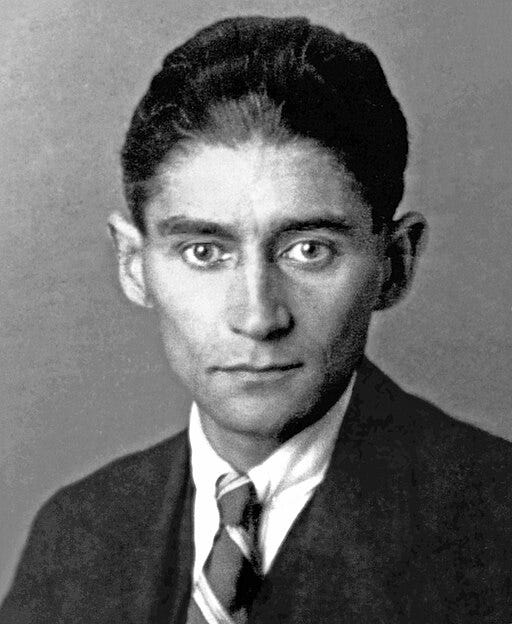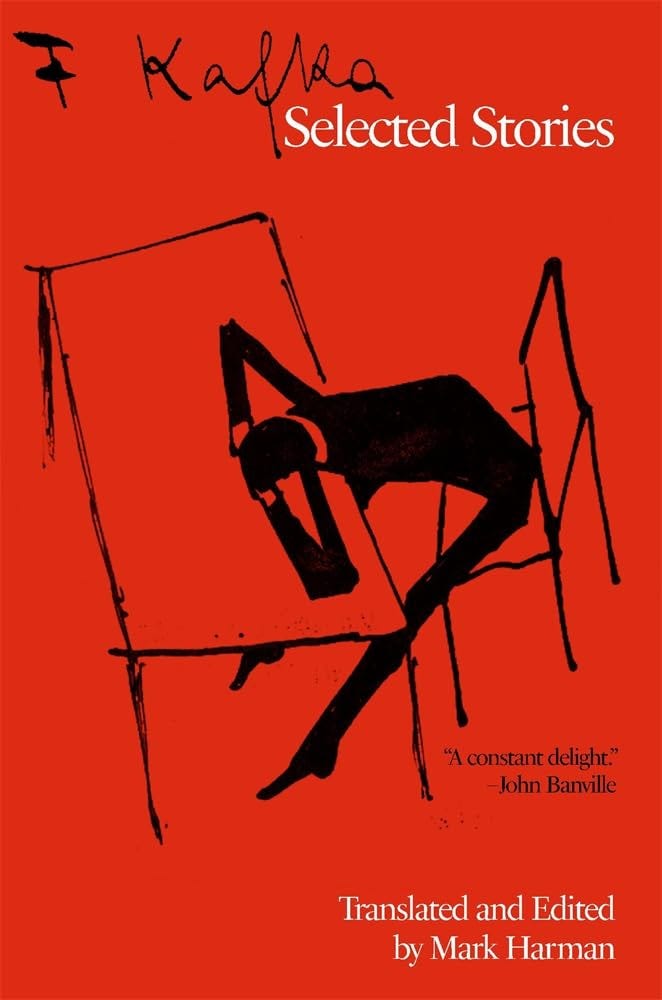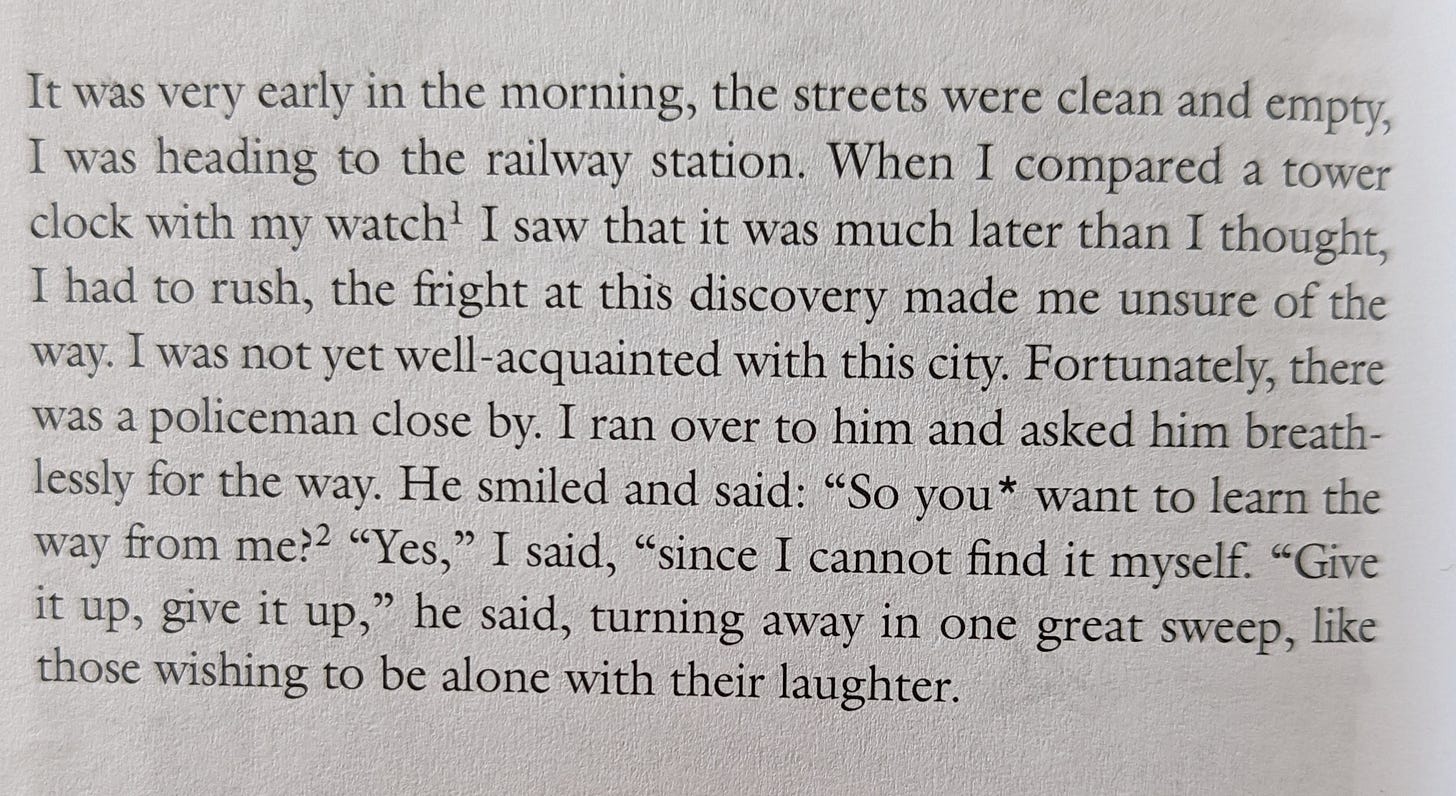Two Kafka Tidbits & A Story
Reading a new translation of Kafka's iconic stories--and featuring one.
I have been savoring a magnificent new version of Franz Kafka’s Selected Stories, translated and edited by Mark Harman, which happens to have a fascinating, 65-page introduction that keeps revealing more and more facts about Kafka that I cannot stop thinking about. Harman is an award-winning translator of Kafka, Rilke, and Hesse, and he is Professor Emeritus of German and English at Elizabethtown College. I am sharing two tidbits of this new book with you, as I work to complete a review essay, coming soon in The Forward.
Kafka in 1923. His girlfriend described him as a meticulous dresser.
The first tidbit comes from Kafka’s girlfriend and first translator, Milena Jesenská, who translated “The Judgment” into Czech. She described Kafka in an obituary she wrote: “He understood people as only someone of great and nervous sensitivity can, someone who is alone, someone who can recognize others in a flash, almost like a prophet. His knowledge of the world was extraordinary and deep; he was himself an extraordinary and deep world.”
Kafka at age 34.
I can’t stop thinking about this concept of “someone who is alone” along with “almost like a prophet”. It reminds me of what Isaac Bashevis Singer said in his Nobel Prize acceptance speech about Jewish writers, in general: “In the history of old Jewish literature there was never any basic difference between the poet and the prophet. Our ancient poetry often became law and a way of life.” Nobel Acceptance Speech — Isaac Bashevis Singer (And in case you missed it, I wrote about Singer in a previous newsletter: Reading I.B. Singer - by Aviya Kushner (substack.com))
I will also say that this new book, edited and translated by Harman, does a beautiful job of revealing Kafka’s “extraordinary and deep world.”
The second tidbit is this unforgettable account of first encountering Kafka, from a writer whose name, like Singer’s, is familiar to all of us.
“The experience of reading the opening lines of Kafka’s iconic story “The Metamorphosis”—or “The Transformation,” as I prefer to call it for reasons explained below—is for Gabriel García Márquez a life-altering experience,” Harman tells us. (You can get a glimpse of why this is a fascinating book from the fact that Harman is changing some very famous titles in translation.)
Here is the part that gets to me. Márquez is describing his first encounter with Kafka. “I thought to myself that I didn’t know anyone was allowed to write things like that. If I had known, I would have started writing a long time ago. So I immediately started writing stories.”
If you need something that will get you “immediately started writing stories,” I recommend this book. It’s out now, from Harvard University Press.
A Very Short Story by Kafka
And now, because I cannot resist, here is one of the shortest stories in the book—”A Commentary,” translated by Harman:
Check out that asterisk. Harman explains that the policeman addresses the narrator using the “du” pronoun, “which is generally reserved for family, close friends, colleagues, children, or subordinates. The unconventional use of the informal “Du” makes it difficult to interpret exactly what is meant: is the policeman expressing sympathy, ambivalence, or contempt?”
I hope this short note gives you a sense of Harman’s mastery of his subject.
Poetry Salon Monday, June 10th
I’m thrilled to host poets Jessica Jacobs and Yerra Sugarman at the next salon, just before Shavuot on Monday, June 10th at 8 EST/ 7 CST. Each poet will read 3-4 poems and talk about how the poems were made. Then we will open it up to your questions and comments. These lovely, intimate salons are for paid subscribers of this newsletter, which make continuing this enterprise possible! Monthly and annual subscriptions are available, for yourself or as a gift for someone else who loves literature, translation, and ideas.
You can read about Yerra’s beautiful work here: The Poetry of Vicarious Witness - by Aviya Kushner (substack.com) And you can read about Jessica’s lovely latest collection, Unalone, in the most recent edition of the newsletter here: Poems About Abraham - by Aviya Kushner (substack.com) As always, I encourage requesting books at your library, or buying these collections to enjoy again and again.
Poet Yerra Sugarman.
Poet Jessica Jacobs.
Noticing Hebrew in English Books
I have a new piece up in The Forward about a wonderful trend—bits of Hebrew in new English-language books. Why Hebrew has started showing up in unexpected places – The Forward. In the hours since the piece was posted, I have heard from other writers who are also experimenting with bits of Hebrew in English, like poet Richard Chess, who emailed me a poem of his titled “Language Lesson”. And I will end by saying that one of the delights of this new Kafka book is the care Harman displays in showing Kafka’s deepening interest in Judaism, including both Hebrew and Yiddish, and involving language lessons.
Hope to see you Monday night at the salon! Until then, happy reading!
************************************************************************************************************
Hope you found this newsletter meaningful! Thank you for your support of writing with depth.








In the context of the early Yiddish literature Kafka was reading, his work is not so so strange. He's known to have read Nahman of Breslov (I think it was David Roskies who called Nahman the first Yiddish writer)--and if you know Nahman's tale of the prince who thought he was a chicken the Metamorphosis begins to seem less strange. I audited David's brilliant classes on Yiddish literature when I was writing The Seventh Beggar.
Hi Aviya, great newsletter! Are these new translations, or translations of previously unpublished stories? I'm asking because I have The Complete Stories published by Shocken in 1971, translated by Nahum Glatzer. Thanks!